CELTIC GODS AND GODDESSES

Celtic (Gaulish) God of the apple tree.
Aine of Knockaine

Celtic (Irish) Goddess of love and fertility, later known as the fairy queen. Goddess related to the moon, crops, and farms or cattle. Aine is revered among Irish herbalists and healers and is said to be responsible for the body's life force. A woman of the Leanan Sidhe (Sweetheart of the Sidhe). Some said she was the daughter of Manannan, some said she was the Morrigan herself. There was a stone, Cathair Aine, belonging to her and if anyone sat on the stone, they would be in danger of losing their wits, sit three times and they would lose them forever. Aine was very revengeful, and it was not a safe thing to offend her.
Airmid
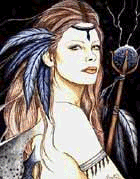
A healing Goddess of the celtic order of Tuatha de Danaan, Goddess of medicinal plants and keeper of the spring. Regenerates, or brings the dead to life again.
Amaethon
Celtic (Welsh) God of agriculture, husbandry, and luck.
Andraste
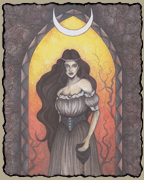
Celtic (Britania) The moon, divination, rabbit magic.
Angus Og
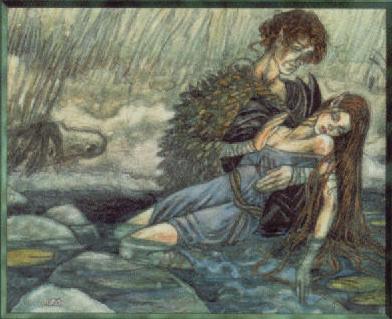
Celtic (Irish)God of youth, love, and beauty. One of the Tuatha De Danaan, name means "young son". He had a harp that made irresistible music, and his kisses turned into birds that carried messages of love. His brugh, underground fairy palace, was on the banks of the Boyne River. Variants: Angus or Oengus of the Brugh, Angus Mac Oc, Oengus Mac In Og.
Anu
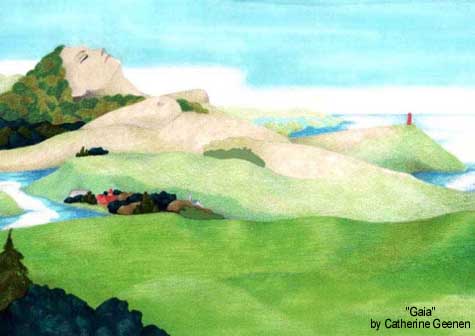
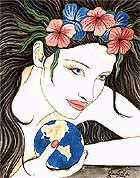
Manifestation magic, moon, air, fertility, prosperity. Celtic (Irish) Goddess of plenty. Mother earth Goddess and maiden aspect of the Morrigu.
Aoibhell Celtic (Irish)
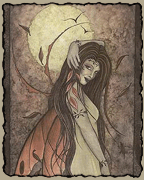
Another woman of the Sidhe, she made her dwelling in Craig Liath. Legend has it that she gave a golden harp to Meardha, Murchadh's son, when he was getting his schooling at the Sidhe in Connacht and learned of his father's death. Whoever heard the playing of the harp would not live long afterward. It was this harp that Cuchulain heard the time his enemies were gathering against him at Muirthemne, and he knew by the sound that his life was near its end.
Arawn
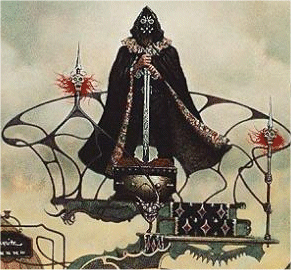
Celtic (Welsh) God of the underworld, terror, revenge, and war. Invoke during element of earth. Only when Christian conversion, did the Welsh look on the underworld as hell.
Arianrhod
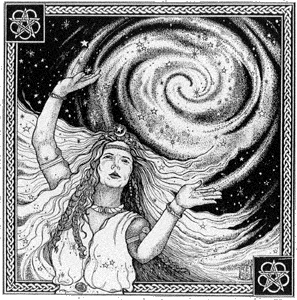
"The Silver Wheel", "High Fruitful Mother". Celtic (Welsh) Goddess, the sister of Gwydion and wife of Donn. Deity of element of Air, reincarnation, full moons, time, karma, retribution. The palace of this sky Goddess was Caer Arianrhold (Aurora Borealis). Keeper of the Silver Wheel of Stars, a symbol of time and karma. Her ship, Oar Wheel, carried dead warriors to Emania (Moon-land).
Artio
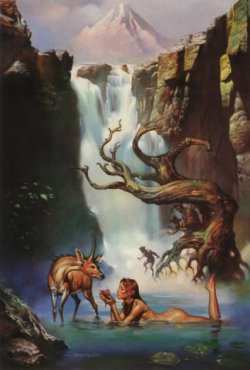
Celtic wildlife Goddess.
Babd Catha

Celtic (Irish) Goddess of war. Mother aspect of the triple Goddess. Symbolizes life, enlightenment, wisdom and inspiration. Sister of Macha, the Morrigan, and Anu, the name of this Goddess means "boiling," "battle raven," and "scald-crow". Known as Cath Bodva in Gaul. A Mother Goddess and Triple Goddess and part of the trio for which Ireland was named including Eriu and Fotia or Fodla, Badb's cauldron boiled with the ever-producing mixture that produced all life. Variants: Badhbh, Badb, Banba
Balor
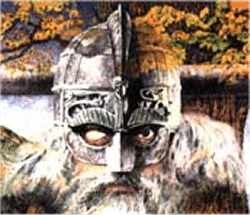
Celtic. Although he was born with two good eyes, one was ruined in an accident; the eye is so hideous that he only opens it in battle so that its venom will slay whoever is unlucky enough to catch glimpse of it; his daughter marries Cian. Also known as Balor of the Evil Eye.
Bel
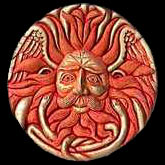
Celtic (Irish) Fire and sun God, also God of purification, science, fertility, crops and success. Symbolizes element of fire, health. A sun and fire God closely connected with the Druids and the festival of Beltaine (May 1). Variants: Belenus, Belinos, Beli Mawr (Wales).
Blodeuwedd

Celtic (Welsh) Maiden form of the Triple Goddess. She was changed into an owl for committing adultry and plotting to kill Lleu. Symbolizes wisdom, lunar mysteries, initiations. Known to help a garden or a child grow. Known as the Ninefold Goddess of the Western Isles of Paradise and Flower-Face, Goddess was created by Math and Gwydion as a wife for the God Lleu
Boann
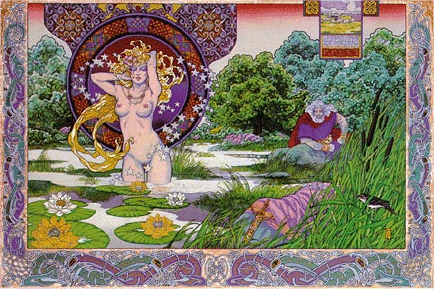
Celtic (Irish) Goddess of the River Boyne and mother of Angus Mac Og by the Dagda. She was the wife of Nechtan, a god of the water. Likewise, Boann was herself a water-goddess, and one of her myths concerns the water. According to legend, there was a sacred well (Sidhe Nechtan) that contained the source of knowledge. All were forbidden to approach this well, with the exception of the god Nechtan (as was noted, Boann's husband) and his servants. Boann ignored the warnings, and strode up to the sacred well, thus violating the sanctity of the area. For this act, she was punished, and the waters of the defiled well swelled and were transformed into a raging river, a river that pursued her. In some versions, she was drowned; while in others, she managed to outrun the currents. In either case, this water became the river that was known henceforth as the Boyne, and Boann thereafter became the presiding deity.
Another aspect of the myth of Boann is that she bore Angus. She and the All father of the Tuatha De Danaan, the Dagda, engaged in an illicit affair that resulted in the birth of this god of love. However, since both Boann and the Dagdha wished to keep their rendezvous a secret, they used their divine powers to cause the nine month gestation period to last but a single day - or so it seemed, for the sun was frozen in the sky for those nine months, never setting and never rising. On this magical day, Angus emerged into the world. She held the powers of healing. Variants: Boannan, Boyne.
Bran
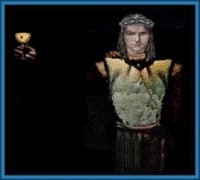
Celtic (Irish) God of health. A beautiful woman appeared before Bran and told him to search for a group of islands where there was no sorrow, sickness, death, or evil. He voyaged until he found these islands, most importantly the Isle of Women. He eventually was lured away by a friend, but when he found he was unknown in his native Ireland, he left again. Brother of Branwen and Angus Mac Og. Also known as Bran the Blessed.
Branwen

Celtic (Irish)Goddess of love and beauty. The sister of Bran the Blessed and Manannan mac Lir, daughter of Lir, and wife of the Irish king Matholwch. Died of a broken heart after Bran's death. Known as Venus of the Northern Seas
Brighid
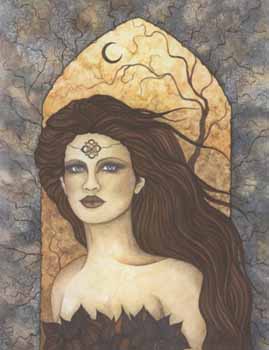
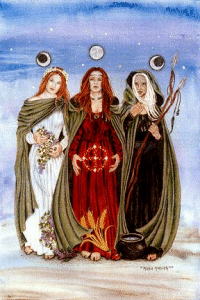
Celtic (Irish). One of the triple Goddesses of the Celtic pantheon. She is the daughter of The Dagda, the All Father of the Tuatha de Danann, one of the most ancient people of Northern Europe. Some say there are actually three Brighids; one is in charge of poetry and inspiration; one is in charge of midwifery and healing, and the last is in charge of crafts and smiths.
She probably began as a sun Goddess. According to legend, she was born at sunrise and a tower of flame beamed from her head.
As Goddess of fire and water, she is immortalized by many wells and springs. Most important of her monuments, though, was a shrine at Kildare where there was a perpetual flame burning for Brighid. It was tended by nineteen virgins called the Daughters of the Flame, wearing deep crimson habits and bearing swords. They would not talk to men, nor could men come near the shrine. Her feast is St.Brighids Days in Ireland and is the Pagan Festival of Imbolc
When Christianity began its onset, so loved was Brighid that she was made a saint. However, the upkeep on her flame was considered pagan by the church and it was extinguished out of more than a thousand years of burning. St. Brigit remains one of the most popular Irish saints today, along with Saint Patrick.
Identical to Juno, Queen of Heaven. Symbolizes human potential. Also known as Brigit, Brigid, Brigindo, Bride.
Dark the bitter winter,
cutting its sharpness,
but Bride's mantle,
brings spring to Ireland.
-Translated from Gaelic text.
Bris
The Celtic (Irish) God of fertility and agriculture. He is the son of Elatha, a prince of the Fomorians, and the Goddess Eriu.
Caer Ibormeith Celtic
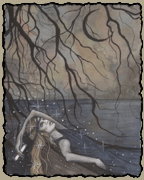
Celtic(Irish) Goddess of sleep and dreams; and perhaps a less violent version of Mare; daughter of Ethal Anubail, a faery king of Connacht. She often took the form of a swan who lived on a lake called Dragon's Mouth, and wore a copious golden chain with 130 golden balls on a silver chain about her slender neck.
She was loved by Aengus MacOg, God of young love. When he awakened from a dream of her he sought her out. After he found her, he too became a swan, and the two of them flew and sang the sweetest, most restful music ever heard upon this earth. Together they flew away to Bruigh na Boinne, his megalithic site north of Tara, where they sang so wonderfully that the whole of Ireland fell into a peaceful sleep for three days and three nights.
Cailleach

Celtic (Irish & Scottish) Goddess of disease and plague. A Destroyer, or Crone, Goddess, she was also called "Veiled One". As the Crone, she ruled with the Maiden and the Mother. Monsterous Dogs guarded the gates of her afterworld realm where she received the dead. Celtic myth has her gatekeeper dog named Dormarth "Death's Door". Irish bards who could curse with satire were often called cainte "dog".
Camalus
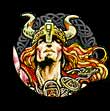
"Of the Invisible Sword", "Heaven". Celtic God of war and sky. Similar to Mars, only more vicious.
Cernunnos

Celtic God of virility, fertility, life, animals, forests and the underworld. The Horned or Antlered God is born at the winter solstice, marries the Goddess at Beltane, and dies at the summer solstice. He alternates with the Goddess of the moon in ruling over life and death, continuing the cycle of death, rebirth and reincarnation.
Symbolizes element of earth, love, fertility, death the virile male aspect and the dark half of the year. The two fold aspect of the God year with the Greenman or Jack o' the Green being his light aspect. This takes on a similarity to the Oak King and Holly King legend. Leads the wild hunt at Samhain, hence the day best associated with the Dark Lord.
Also A consort to the mother Goddess. Druids knew him as Hu Gadarn, the Honored God. Ancient Celtic images show him seated in a lotus position, naked, with antlers or horns on his head. Christians demonized this benevolent God for easy conversion and is where the image of the Christian devil comes from(Couldn't be further from facts nor truth but alas yet another tragedy of misdeed and "bearing false witness", to quote a commandment).
Animals that were sacred to him: bull, ran, stag, and horned serpents. Variants: Cerowain, Cernenus, Herne the Hunter.
Cerridwen

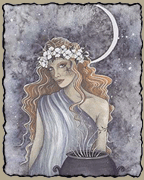
Celtic (Welsh) Moon, Grain and Nature Goddess. Cerridwen's symbol is a white sow. Patron of the poets, greatest of all the bards.
She prepared in a cauldron a magical brew which stewed for a year and would yield three precious drops. These would bestow on the receiver the wisdom of the past, the knowledge of the present, and the secrets of the future.
Cerridwen symbolizes luck, element of earth, death, fertility, regeneration, inspiration, inspiration, the arts, science, poetry, astrology/zodiac.
Cian
Celtic (Irish) The father of Lugh
Creidhne
God of metalworking; one of the trio of craft-gods of the Tuatha De Danaan.
Creiddylad
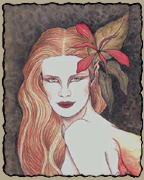
Celtic (Welsh) Goddess of flowers, love. A daughter of the sea God Lir, connected with the festival of Beltane and called the May Queen. Variants: Creudylad, Cordelia.
Cyhiraeth
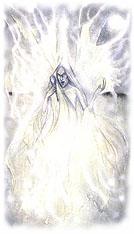
Celtic Goddess of streams, her scream fortells death. Coincides with the Beansidhe or Banshee
The Dagda
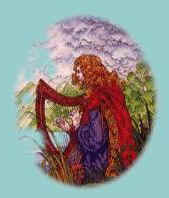
Celtic (Irish) God of the Earth and All Father. He mates with his wife The Morrigan or Raven on the Celtic New Years Eve (Samhain) Also had a secret love of Boann. Also a God of death; the father of Brighid.
A formidable fighter, but a God of simple tastes who dresses in a brown tunic, hooded cape and leather boots. Dagda had a club which could slew nine men with one end, but could bring back life with the other end. He possessed two swine, one of which was perpetually roasting, the other perpetually growing. His other symbols are the bottomless cauldron of plenty and a harp with which he controls the seasons and is the harp that is seen on many Irish flags and symbolizes Ireland to this day(Hehe, Including the signature symbol for Guiness Beer). God of the arts, knowledge, magic, music, prophecy, prosperity, regeneration. Known as the "Good God" and "Lord of the Heavens," he was one of the high kings of the Tuatha De Danaan and had four great palaces under hollow hills.
Danu
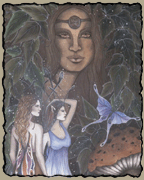
Celtic (Irish) Goddess, the mother of The Dagda the All father, Creation Goddess, and Mother of the Tuatha de Danaan. Aspect of the Morrigan or Triple Goddess. Considered to have been an early form of Anu, the Universal Mother. Patroness of wizards. Symbolizes rivers, water, wells, prosperity, magick, and wisdom. Tuatha de Danaan literally means Children or Clan of Danu. The Tuatha de Danaan are the Fae folk of Ireland. EXTREMELY potent Goddess form I easily connect with and work very closely with, personally for most of my rituals and castings. Her celebrations were either Beltane and/or Litha (Summer Solstice)
Dewi
An old Celtic (Welsh) God represented by a red serpent or dragon.
Diancecht

Celtic (Irish) God of healing and medicine. Once saved Ireland. Held sacred to the Druids due to healing powers and often called upon for such castings and rituals.
In the first battle of Moy Tura, Nuada lost his hand. Diancecht fashioned a new one of silver and joined it to Nuada's arm. One day, Diancecht's son Miach took what remained of Nuada's original flesh hand, placed it next to Nuada's arm, and spoke an incant. After three days and nights the hand was rejoined to the arm seamlessly.
Nuada rejoiced, but Diancecht was furious that his son was a better healer than he was. Diancecht struck Miach thrice on the head with his sword. Miach was able to heal each wound. Diancecht, more furious now, split Miach's head in two, killing him. From Miach's grave grew 365 herbs, each one with curative powers for one of the 365 nerves in the body. Miach's sister, Airmid, picked these herbs and arranged them according to their curative powers.
Diancecht became so enraged that his son rivaled him even after death that he scattered the herbs about, hoplessly confusing them. If Diancecht hadn't done this, man would be immortal.
Dis Pater

Celtic (Gaulish) God, originally of death and the underworld, eventually the chief of Gods. It is said that Dis Pater is the ancestor of all the Gauls.
Don
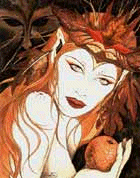
Celtic (Welsh) Queen of the Heavens and Goddess of air and sea. Ruled over the land of the dead. Corresponds to the Celtic (Irish) Goddess Danu. Symbolizes control of the elements, the moon.
Druantia

"Queen of the Druids". Celtic Fir Goddess and Mother of the tree calender. Symbolizes protection, knowledge, creativity, passion, sex, fertility, growth, trees and forests. Her feast day was Beltane
Dylan

Celtic (Welsh) sea God and brother of Lleu. Son of the waves, God of the sea. His symbol is a silver fish. Son of Gwydion and Arianrhod.
Elaine
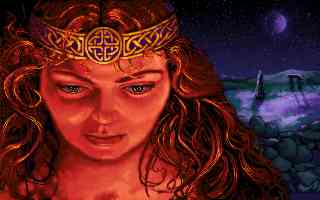
Celtic (Welsh) aspect of the maiden, she was later transformed in the Arthurian sagas.
Epona


Celtic (Britania & Gaul) Goddess of horsebreeding, healing spring, prosperity and mountains. Called Divine Horse and the Great Mare, the Goddess of horses was acknowledged and worshipped by Roman soldiers. Her symbols were horses and dogs.
Eostre

Celtic (Irish & Britania)Goddess of Spring, worshipped at festivals all over Britain. She gave her name to Easter and some of the present folk customs performed at that time may be traced to those who worshipped her. Pagan feast day, Ostara.
Eriu
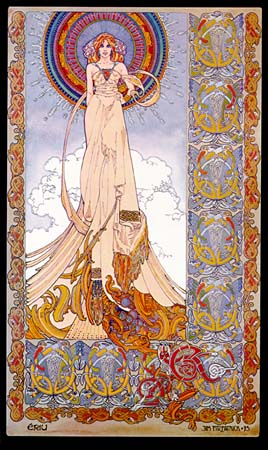
Celtic (Irish)Another of the three Goddesses after which Ireland was named. Along with Banb and Fotia or Fodla.
Flidais
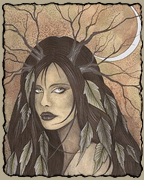
Celtic (Irish) Goddess of the forest, woodlands, and wild things. She had a magic cow that could produce milk enough for three hundred men in one night. Also a shapeshifter who rode in a deer-drawn chariot. Wife of Ailill. Associated with protection of wild animals.
Fodla
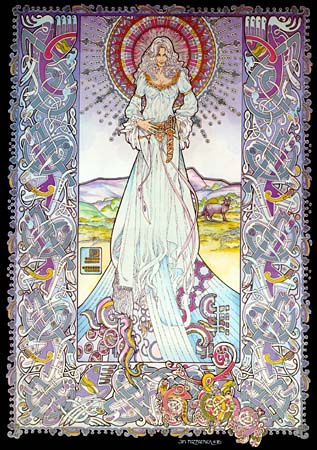
Celtic (Irish)Third of the trinity of goddesses of Ireland along with Babd and Eriu. Variants: Fotia.
Goibhniu
Irish and Celtic (Irish & Welsh) God of blacksmiths, weapon-makers, brewing.. Weaponry he forged for the Tuatha de Danaan were said to never miss or dullen. He possessed a potion which made the drinker invincible. Also called the Great Smith. One of a triad of Tuatha de Danaan craftsmen, the other two craftsmen were Luchtain the wright, and Creidne the brazier.
Gwydion
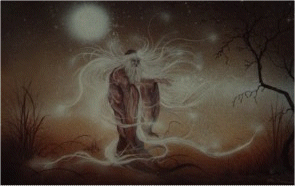
Celtic (Welsh) Warrior and magician God, God of enchantment, illusion, magick. Father of Lleu and Dylan. A son of Donn, the sea Goddess, and brother to Govannon, Arianrhod, and Amaethon (God of agriculture). Known as a great wizard and bard in northern Wales. He was many skilled, like the Irish God Lugh. He was a shapeshifter whose symbol was a white horse.
Gwynn Ap Nudd
Celtic (Welsh)-Celtic God of the underworld. Originally a war God who hunted men's souls and lead them to Annwn, the land of the dead. In Celtic (Welsh) legend he is the king of the faeries and elves. First known as King of the Fairies and Lord of the Underworld, this God later ruled over the Plant Annwn, subterranean fairies. Also known as Gwynwas.
Labraid
Celtic (Irish) God of the underworld. Corresponds with Gwynn Ap Nudd.
Llew Llaw Gyffes
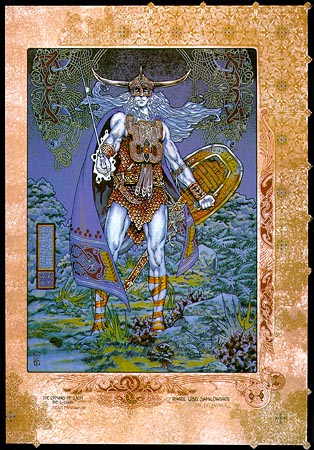
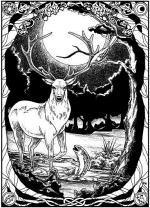
Celtic (Irish & Welsh) God of harpers, healing, poets, smiths, sorcerers, and waters. Son of Arianrhod and raised by his uncle Gwydion. A curse prohibited him from having and earthly wife, so his uncles made him one out of flowers and named her Blodeuwedd. She and her lover, Gronw Pebr, plotted Llew's death, but because of Llew's divine origins, the death simply became an annual duel between the two men. His symbol is a white stag, and is celebrated on August 1, the Celtic ceremony of Lughnasadh. Variants: Llud Llaw Ereint, Llew, Lleu, Lugh
Llyr
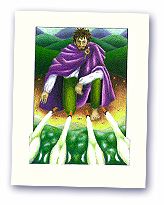
Irish and Celtic (Welsh) God of waters and the sea. May have also ruled the underworld. The father of Manawydan, Bran the Blessed, and Branwen. Variants: Lyr, Lir.
Lugh

Celtic (Welsh, Irish) God, also known as Lleu, Llew and Lugh the Many Skilled. He is a druid, carpenter, poet, and mason. His animals are the raven and the lynx. He symbolizes healing, reincarnation, prophecy, and revenge. Also a Sun God as well hence the Pagan Sabbath Lughnasadh, his namesake. Son of Cian, a Tuatha de Danaan. Of legend, his skills were without end; in Ireland he was associated with ravens; and a white stag as his symbol in Wales. He had a magic spear and otherworldly hounds.
I am Lugh Samildanach
I am Lugh the Il-Dana
I am Lugh, master of the battle
I am Lugh, master of healing
I am Lugh, master of knowledge
I am Lugh, master of sailing
I am Lugh, master of sorcery
I am Lugh, master of smithing.
-"The Coming of Lugh", Iarwain.
Luchta
Celtic (Irish)God of wrights; one of the triad of craft-gods of the Tuatha De Danaan
Macha

Celtic (Irish) Goddess of war, life, and death. Goddess of cunning, death, sheer physical force; protectoress in both battle and peace. Known as the Crow or Raven as she wore a cloak of RavenÆs feathers, often appeared as a Raven or Crow, Queen of Phantoms, and the Mother of Life and Death, she was honored at Lughnasadh or Samhain. Variants: Mania, Mana, Mene, and Minne.
Maeve
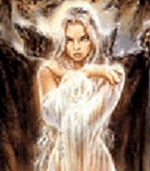
Celtic Goddess of Earth, fertility and war. Also known as Queen Maeve and known as Mebd. She was a great conqueror and enjoyed enslaving the men of the Armies she defeated as spoils of war to pleasure her at will. A VERY lustful woman. Also known as the "Drunk Woman". The mere sight of Maeve or Medb blinds enemies, and she runs faster than the fastest horse. A lewd woman, she needs thirty men a day to ease her sexual appetite. Also a fertility Goddess.
Manannan Mac Lir - (May-nah-naun Mac Leer)

Celtic (Irish & Welsh)Patron of sailors and merchants. His famed possessions include the yellow shaft, the red javelin, the boat, the wave-sweeper, a horse called Splendid Mane, and three swords named retaliator, great fury, and little fury, the chief Irish sea God whose special retreat was the Isle of Man. In Wales his name was Manawydan Ap Llyr. He also had a suit of armor that made him invisible; and his swine kept the Tuatha de Danaan from aging. He has the gift of immortality
Margawse
Celtic (Britania & Welsh) mother aspect of the Goddess, she was transformed in the later Arthurian sagas.
Math Mathonwy

Celtic ( Irish & Welsh) God of magick, sorcery, and enchantment. Legend has him as a king who was also a God of enchantment and magick.
Mider
Celtic God of the underworld.
Morrigan
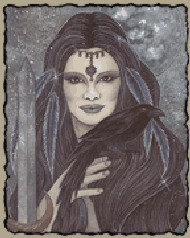
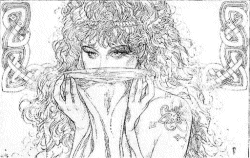
"The Great Queen". Celtic Goddess of war and death who could take the shape of a crow or raven. Supreme warrior Goddess. She is associated with the sometimes frightening aspects of female energy. Married to the Daghda. She symbolizes the power of fertility, the dark Goddess' prowess, death, war, fate. A shapeshifting war Goddess of sensuality, magic, prophecy, revenge, war. Known as Great Queen, Supreme War Goddess, Queen of Phantoms, and Specter Queen, she kept company with Fea (hateful), Badb (fury), and Macha (battle). Also known as a Triple Goddess form Maiden, Mother and Crone. Variants: Morrigu, Morrighan, Morgan.
Myrrdin
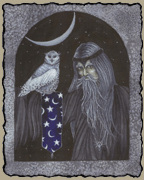
"Merlin", Celtic (Britania, Irish & Welsh) Sorcerer, Druid, Wizard and Magician. Originally an ancient Welsh Druid, priest of the old religion, and great magician. He was transformed in the later Arthurian sagas. Tradition says he learned his powerful magic from the Goddess in her forms of Morrigan, Viviane, Nimue, and Lady of the Lake. Legend says he now lies sleeping in a hidden crystal cave. Variants: Merddin, Merlyn.
Nantosuelta
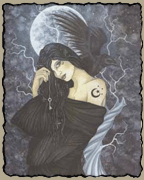
Celtic (Gaulish) Goddess of nature, valley, and streams. Her symbol, like the Celtic (Irish) Goddess Morrigan's, is a raven.
Neit
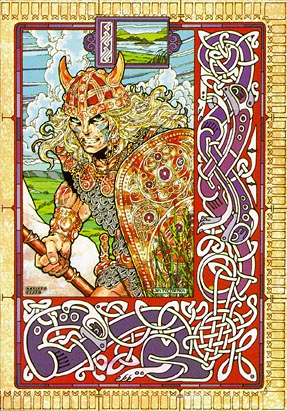
Celtic (Irish) God of battle.
Nemain
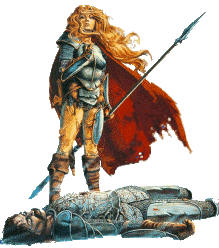
Celtic (Irish) Name means, "Panic". Celtic war Goddess.
Niamh (Nee-av)
Celtic (Irish) Goddess of beauty and brightness. Helps heroes at their death.
Nostiluca

Celtic (Gaulish) Witch Goddess.
Nuada - (Noo-ada)
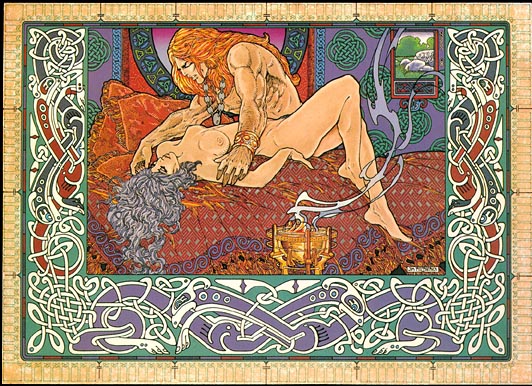
Celtic (Irish & Welsh) God of harpers, healing, historians, magic, poets, warfare, writing. King of the Tuatha de Danaan at one time, he had to step down when he lost his hand in battle; it was replaced by a silver one. Variants: Lud, Lludd, Llaw, Ereint, Nudd, Nodens.
Ogma
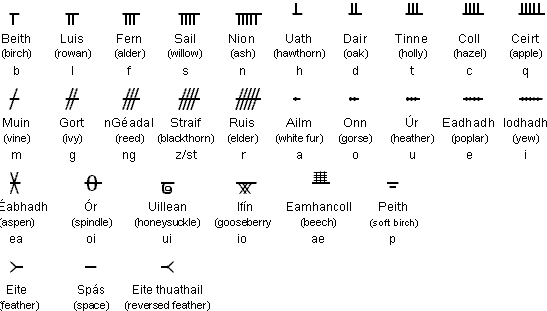
A great Celtic (Irish) Warrior God often associated with Heracles. Patron God of scholars and eloquence from Gaul. He invented the runic language of the Druids, the Ogham alphabet. His name means "sun face" or ôHoney Mouthedö. Married Etain. Symbolizes image and poppet magic, incantations, charms, health, eloquence, genius, inspiration, language. Also known as Ogmios, Oghma, Grianainech (sun face), Cermait (honey-mouthed).
Olwen
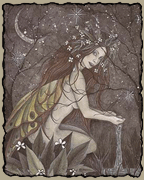
Celtic (Welsh) Goddess of flowers and springtime. Also symbolizes love and re-birth.
Under the forgotten oak
She slept
Lily breasts
And crocus arms
And wild daisy hair
-ForestCloud
Pwyll
Celtic (Welsh) God, prince who married the Goddess Rhiannon and bore a son, Pryderi. God of cunning, virtue. Called Pwyll pen Annwn (Pwyll, head of Annwn) because he replaced Gwynn ap Nudd as ruler of the underworld at one time.
Scathach (Scau-ahch)
Celtic (Irish & Scottish) Goddess of healing, magic, fighting arts, prophecy. Called the Shadowy One, She Who Strikes Fear, and the Dark Goddess, she was a warrior woman and prophetess who lived in Albion, possibly on the Isle of Skye, and taught fighting arts. Variants: Scota, Scatha, Scath.
Rhiannon

Celtic (Welsh) Patron Goddess of horses and birds considered the counterpart of the Gaulish Goddess Epona. She symbolizes fertility, the moon, enchantment, charms, and poetic incantations.
Rhiannon gave birth to a baby boy, and while she slept, her nurses were supposed to watch over the child. But they failed in the task, and the child was mysteriously abducted during the night. Before Rhiannon awoke, the nurses found that the baby had disappeared, and fearing revenge, they smeared the blood from the dog's bones around Rhiannon's sleeping body. When she awoke, they declared that she had devoured the child.
Judgement was passed, and Rhiannon's punishment was to remain in the palace of Narberth for seven years. Every day, she would sit near a horse block, and relate her story to everyone who passed unless they had knew it already. She also had to offer to guests and strangers in on her back. Forunately for her, they rarely accepted the offer and permitted her to perform her penance.
Rosmerta
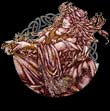
"The Great Provider". Celtic Goddess of fertility and wealth. Her symbols are a cornucopia [horn of plenty] and a stick with two snakes. She may be invoked for fertility or money.
Sequana
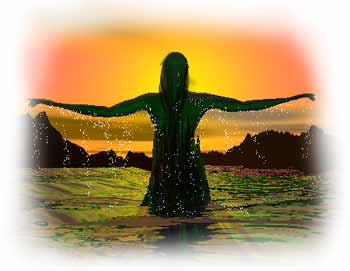
Celtic river Goddess. Health.
Shannon
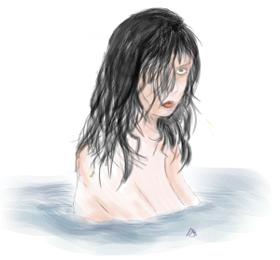
Celtic (Irish) Goddess of the river Shannon.
Smertios
Celtic (Gaulish) war deity.
Sucellus
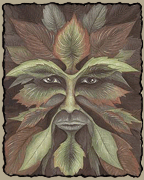
Celtic (Gaulish) God of agriculture and the forest, ferries souls to the underworld. His consort is Nantosvelta.
Taliesin

Celtic (Welsh) God of song, known as Prince of Song, Chief of the Bards of the West, and Patron God of the Druids, he was a great magician, bard, and shapeshifter who gained his knowledge from the Goddess Cerridwen directly.
Taranis
Celtic (Gaulish) Thunder God. See also Jupiter. Variants: Taranus
Tephi
Celtic (Irish) Goddess who co-founded tea.
Teutates
Celtic (Gaulish) God of war, money, and fertility worshipped mainly in Gaul. See also Mars.
The White Lady

Celtic all Celtic countries; goddess of death and destruction. Called the Dryad of Death and Queen of the Dead, this goddess was a Crone aspect of the Goddess.